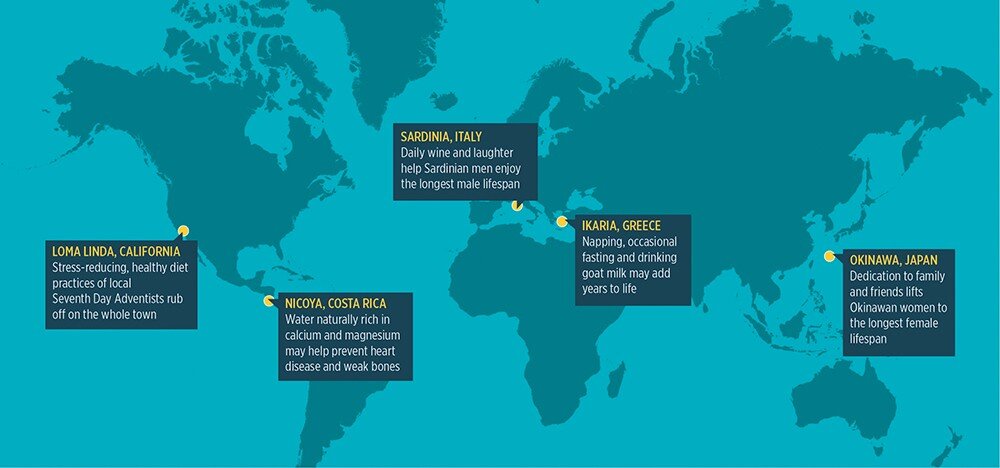Blue Zones of Happiness
Blue Zones
While life is certainly complex, I truly believe that for the most part happiness is a choice. Once made, that choice to be happy includes taking proactive steps that foster happiness. There are five places in the world where proactive happiness steps are taken daily, over the course of lifetimes, leading to remarkable outcomes.
I first learned of Blue Zones in coaching school and I was fascinated. Dan Buettner, Blue Zones founder, is a National Geographic Fellow and author of multiple New York Times bestsellers. He has discovered five places in the world, which he dubbed “blue zones,” where people live the longest, and are healthiest. In these regions, he found pockets of people with the highest life expectancy, or with the highest proportions of people who reach age 100:
The Five Blue Zones
Barbagia region of Sardinia – Mountainous highlands of inner Sardinia with the world’s highest concentration of male centenarians.
Ikaria, Greece — Aegean Island with one of the world’s lowest rates of middle age mortality and the lowest rates of dementia.
Nicoya Peninsula, Costa Rica — World’s lowest rates of middle-age mortality, and the second highest concentration of male centenarians.
Loma Linda, California — Home to the world’s highest concentration of Seventh Day Adventists, who live 10 years longer than their North American counterparts.
Okinawa, Japan — Females over 70 are the longest-lived population in the world.
Integral to happiness and longevity are lifestyle and environment: Buettner notes that studies showing that genetics determine only about 20% of the average person lifespan. Buettner identifies nine commonalities that lead to longer, healthier, happier lives:
Blue Zones Power 9
Move Naturally — The world’s longest-lived people don’t pump iron, run marathons or join gyms. Instead, they live in environments that constantly nudge them into moving without thinking about it. They grow gardens and don’t depend on mechanical conveniences for house and yard work.
Purpose — Knowing your sense of purpose is worth up to seven years of increased life expectancy.
Down Shift — Stress leads to chronic inflammation, associated with every major age-related disease. What the world’s longest-lived people have that others don’t are routines to shed that stress. Okinawans take a few moments each day to remember ancestors, Adventists pray, Ikarians take a nap and Sardinians do happy hour.
80% Rule — “Hara hacki bu” - the Okinawan, 2,500 year old Confucian mantra said before meals reminds them to stop eating when their stomachs are 80% full. The 20% gap between not being hungry and feeling full could be the difference between losing weight and gaining it.
Plant Slant — Beans, including fava, black, soy and lentils, are the cornerstone of most centenarian diets. Meat (mostly pork) is eaten on average only five times per month: serving sizes are 3-4oz., about the size of a deck of cards.
Wine @ 5 — People in all blue zones, (except Adventists) drink alcohol moderately and regularly. Moderate drinkers outlive nondrinkers. The trick is to drink 1-2 glasses per day, with friends and/or with food. And no, you can’t save up all week and have 14 drinks on Saturday.
Belong — Research shows that attending faith-based services four times per month will add 4-14 years of life expectancy.
Loved Ones First — Successful centenarians in the blue zones put family first. This means keeping aging parents and grandparents nearby or in the home (which lowers disease and mortality rates of children in the home too). People commit to a life partner (which can add up to three years of life expectancy) and invest in their children with time and love…which means they’ll be more likely to care for you when the time comes.
Right Tribe — The world’s longest lived people chose, or were born into , social circles that supported healthy behaviors. Okinawans create “moals” — groups of friends that committed to each other for life. Research from the Framinghouse Studies shows that smoking, obesity, happiness, and even loneliness are contagious, meaning the social networks of long-lived people have favorably shaped their healthy behaviors.
As you reflect on these Power 9 behaviors, ask yourself this: Which ones do you or can you embrace in your life? If you need help, give me a shout and let’s discuss.




